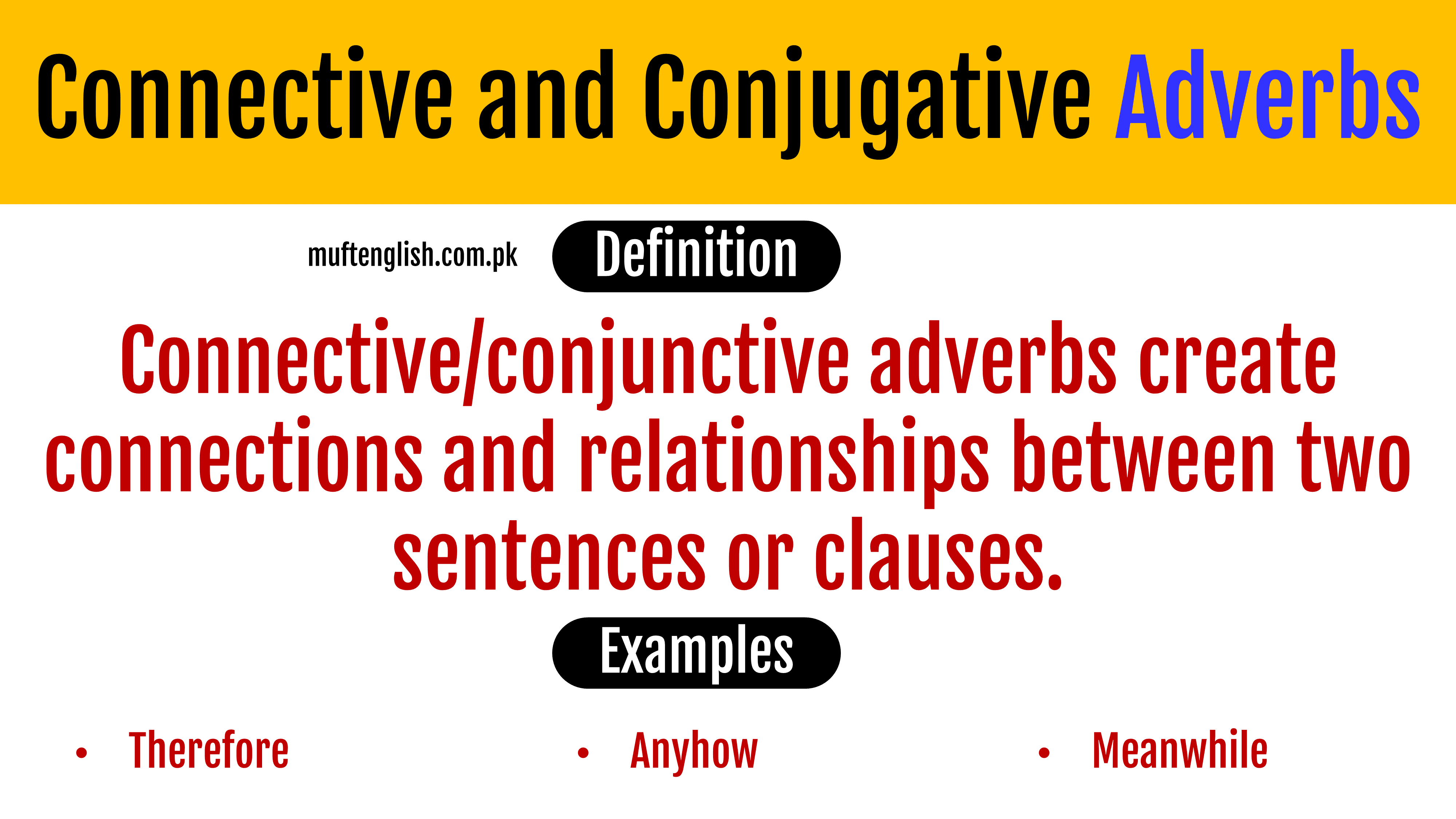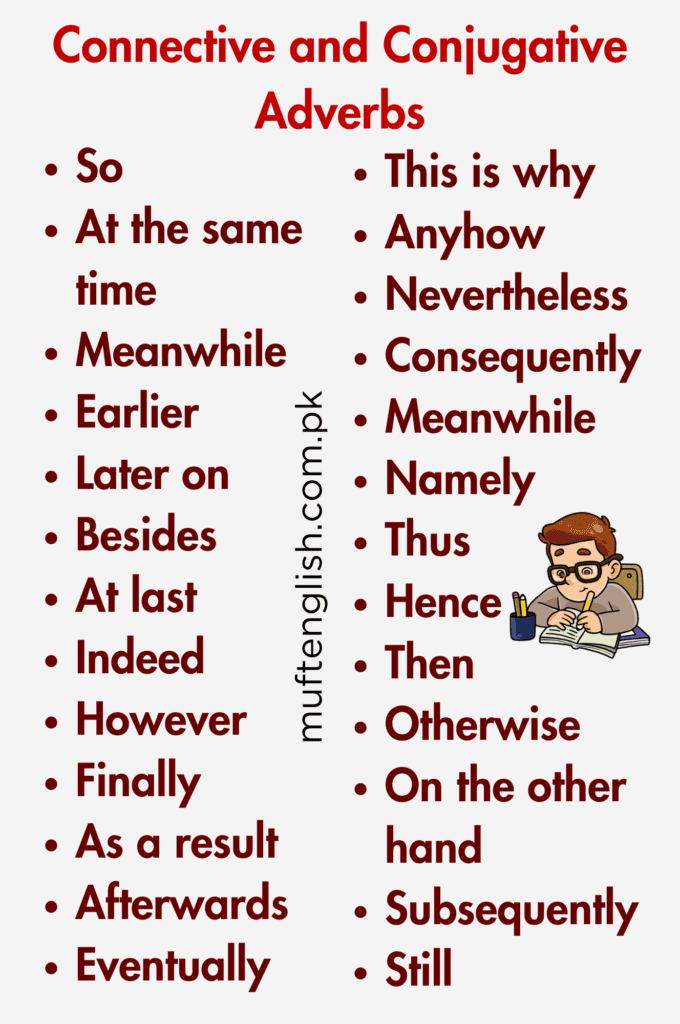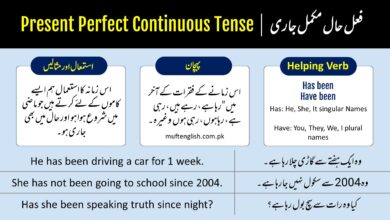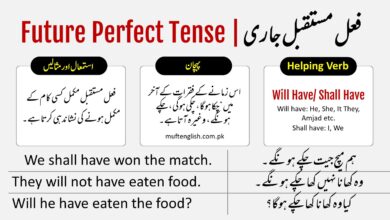Connective and Conjugative Adverbs in English with Examples

Connective and Conjugative Adverbs with Examples in English
Definition: Connective/conjunctive adverbs create a connection and relationship between two sentences or clauses.
The following are connective/conjunctive adverbs:
- Therefore
- This is why
- Anyhow
- Nevertheless
- Consequently
- Meanwhile
- Namely
- Thus
- Hence
- Then
- Otherwise
- On the other hand
- Subsequently
- Still
- So
- At the same time
- Meanwhile
- Earlier
- Later on
- Besides
- At last
- Indeed
- However
- Finally
- As a result
- Afterwards
- Eventually
Placement of connective adverbs in a sentence
Answer: Most of the connective adverbs are moveable, but not all of them; they can come at the beginning, in the middle and at the end of a sentence.
Note: If they introduce a sentence, they are usually followed by a comma and written with a capital letter.
ex
The roads were bumpy. Therefore, we came by train.
Note: If they come in a sentence, they are usually separated by “commas” and written with small letters.
ex
The roads were bumpy. We, therefore, came by train.
Note: If they come at the end of a sentence, commas are used with some connective adverbs and some are not used.
ex
The roads were bumpy. We came by train, therefore.
Question: How do we punctuate connective adverbs?
Answer: There are different ways of punctuating connective/conjunctive adverbs.
The first way: Full stop is put between the sentences. Connective adverb introduces the sentence with a capital letter and precedes a comma.
ex
The roads were bumpy. Therefore, we came by train.
The second way: Semi a colon is put between the sentences. Connective adverb introduces the sentence with a small letter and precedes a “comma”.
ex
The roads were bumpy; therefore, we came by train.
The third way: “Comma” is put between the sentences. Connective adverb introduces the sentence with a small letter and precedes a “comma”.
ex
The roads were bumpy, therefore, we came by train.
The fourth way: Full stop is put between the sentences. Connective adverb introduces the sentence with a capital letter, but it is not followed by a “comma”.
ex
The roads were bumpy. Therefore we came by train.
The fifth way: A comma is put between the sentences. A connective adverb introduces the sentence with a small letter, but it is not followed by a “comma”.
ex
The roads were bumpy, therefore we came by train.
Therefore = For that/this reason = As a result.
ex
He did not come. Therefore, we went behind him.
This is why/that is why = For the reason= Therefore
ex
They did not invite him. This is why, he did not come.
Anyhow Anyway = In any case = In any way
Note: “Anyhow” and “anyway” have got the same meaning. They are used to indicate that the following statement explains or supports the preceding statement.
ex
They did not accept our demands, anyhow, we made them accept our demands.
Note: Both “anyhow” and “anyway” can be used to mean that “I” (the speaker) want to end the conversation.
ex
Anyhow/anyway, thanks a lot. Anyhow/anyway, try to do it if you can.
Nevertheless = However = fit
ex
We misbehaved; nevertheless, he did not say anything.
However = Nevertheless
ex They misbehaved with me; however, I did not say anything.
Consequently =As a result = Therefore
ex
The bank refused to give the company more money. Consequently, the company became bankrupt.
Meanwhile = At the same time=
ex
We were talking about him, meanwhile, he came.
Earlier Comparative adv/adj of early = Before the present towards the past
ex
They have sent another wrong bill; earlier, they had sent one as well.
Later on At a later time.
ex
He did not come. Later on, we called him.
Besides = Introduces a point that supports or gives another reason.
ex
I am afraid, I am too busy to come; and besides, I have already seen the film.
At last = After a long period of waiting.
ex
They protested for many days; at last, their demands were accepted.
Indeed = Infact
ex
I am not sad. Indeed/Infact, I am happy.
For example = For instance
ex
Many countries, for example,/for instance, Mexico and Japan have received many earthquakes in this year.
Finally = At the last of an event or series of events
ex
She performed successfully; finally, she thanked all her seniors.
Namely = Specially: “Namely” is used to introduce additional information which makes it clear who or what you are talking about.
ex
Three students were absent, namely, Asif, Nasir and Adnan.
Thus: In this way = Like this.
He sold his car. Thus, he built his house.
Hence = For this reason.
They were already in difficulty; hence, they refused to help us.
Then: After that/afterwards.
First, they ate food, then, they slept.
Otherwise = Oreise.
Don’t misuse the author’s right; other wise, you can be dealt with the law of the time at the author’s will, at any time.
On the one hand… On the other hand =
Note: They are used to show contrast/opposite ideas.
On the one hand, he is feeding us; on the other hand, he is killing us.
Afterwards = Subsequently:
ex
They ate food, and subsequently, they went out.
Still = Nevertheless = In spite of that
ex
They cheated and trapped him twice, but still, he sits with them.
So = Therefore = This is why/that is why.
The roads were bumpy. So, we came by train.
Perhaps: = May be = Might be = Possibly
Note: Perhaps is used to indicate that you are not sure what you are saying is true.
ex
He does not trust them; perhaps/might be/maybe possibly, they are not trustworthy.
Eventually: In the end / At last
ex
He worked a lot for this company; eventually, he got sick due to overwork.
Note: Dependent clauses can interrupt and can come inside/between the independent clauses. If the dependent clause interrupts and comes inside the independent clause, it is separated by “commas”.
ex
They, although we had been waiting since morning, did not meet us.
He, though (he) is a very rich person, is a miser. She, since (she) has come back, has not touched the broom.
We, since (we) have gotten married, have not fought (husband and wife).
They, after they ate food, slept.
Note: If there are more than two or three verbs in a sentence, each verb is separated by commas.
ex
He comes, checks, directs and teaches the students. She comes, eats, sleeps and goes back.
I go, sit, eat and come out.
They come, play, make a noise and go. We fished, washed, cooked and ate fish.
Note: Each adjective and noun is separated by “commas”, which are being used in series, but the pairs of nouns or adjectives that are considered one unit or which are of the same class or rank go together in pairs and are not separated by “commas”.
Note: “Comma” comes between the units and “and” or “or” comes
between the nouns and adjectives of all units.
ex
All rich and poor, young and old, men and women were sad. When there is a fire in a jungle, all wet and dry, thick and thin burn.
They served us butter and butter milk, bacon and eggs, soup and crackers. At the office or at home, on leave or on the job, sorrowful or happy, he works all the time.
Note: The noun clauses are not separated by “commas”.
ex
Do you know where he lives? I don’t know what he does.
I wonder when he comes.
Note: If there are more than one or two noun clauses in a sentence, they are separated by “commas”.
I am afraid why they go you. I can’t say why they go with them.
ex
Do you know where he lives, what he does?
Everyone knows where he lives, what he does, when he comes.





